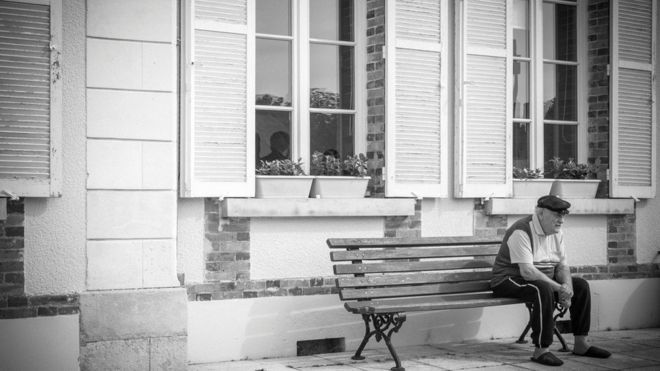 |
|
The grounds of Résidence Saint-Julien remain open to residents, as long as they keep away from each other Image copyright Thai-Binh Phan-Van |
Care homes have become a vulnerable front in the fight against coronavirus - and in France they account for a third of the 17,000 fatalities linked to Covid-19 so far.
One care home in southern France has recorded 36 deaths. But in those that remain virus-free, a desperate effort is under way to keep it out.
The Résidence Saint-Julien in Burgundy has been in full lockdown for more than a month.
Located in the town of Saint-Julien-du-Sault, not far from some of the hardest-hit parts of the Grand Est region and Paris, it allows no visits, no group activities, and meals only in rooms.
None of the 65 elderly residents or 50 staff has so far been infected. The person in charge of keeping it that way is 29-year-old director Hugo Vidal-Rosset.
A particular onus is being placed on workers, he told the BBC. "The challenge is to make them feel responsible without making them feel guilty, because right now the virus can only come from them - right now that's the biggest worry for them."
Another concern among staff is about catching the virus from colleagues.
Distancing rules were put in place at the start of the emergency last month. Face masks are provided and are to be used in any contact with other people.
"There are too many asymptomatic workers," Mr Vidal-Rosset says. "You're taking a risk if you don't have everyone wear face masks."
So far he has had the luxury of running a Covid-free establishment. But these measures, he admits, cannot offer absolute protection.
When one staff member asked him to guarantee there was no risk of infection at work, there was little he could say.
"I would be a liar if I promised you this because I don't know. What I can promise is that we have done everything to make sure the risks are as low as they can be."
How Covid-19 has hit care homes
The director has tried to provide reassurances, telling staff who live in a household where someone has been diagnosed with coronavirus to stay home.
This is not government policy. In France, unlike in the UK, health-care workers in this position are expected to turn up, provided they wear face masks at work.
Until now he has managed to hire replacements for staff he has asked to stay away. "We might not be able to manage it indefinitely. If too many staff were in this situation it would get complicated," he says.
'I'm not thinking about myself'
The care home's residents have responded depending on their circumstances. Gilberte Charbonnier, 94, finds it "difficult because I can't see my son".
Lucette Godard, 86, has no surviving family and takes it all her stride. "I'm used to being isolated," she told the BBC. "I don't mind being locked up all day. I watch TV and do crosswords."
Céline Jeanvoine, 94, also says the lockdown has not affected her: "I'm not thinking about myself. I'm thinking about all those people who lost loved one because of this damn virus."
The crisis has fostered a sense of common purpose among staff, says Mr Vidal-Rosset says.
Unusually for the French health care sector, no-one at the home has called in sick since the start. "The team is united, everyone remains focused," he says.
"We're concentrating on the basics - links with families, and keeping residents in good physical and mental health."
The lockdown, he stresses, has provided an opportunity to allow residents to contact their relatives via videoconferencing apps. "When it turned out that families could no longer come to the home, we decided to speed up that process," says the director.
Now the system is up and running, some residents have had more access to their far-flung relatives than before, because families are staying at home themselves with time on their hands.
"One of the paradoxes of the crisis is that we have been forced to move forward on things that we knew had to come." BBC